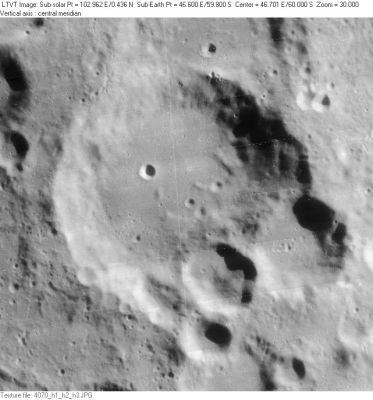Difference between revisions of "Hagecius"
(Created page with "<div id="content_view" class="wiki" style="display: block"> =Hagecius= {| class="wiki_table" | Lat: 59.8°S, Long: 46.6°E, Diam: 76 km, Depth: 3.97 km, [/R%C3%BCkl%2075 R...") |
|||
| Line 3: | Line 3: | ||
{| class="wiki_table" | {| class="wiki_table" | ||
| | | | ||
| − | Lat: 59.8°S, Long: 46.6°E, Diam: 76 km, Depth: 3.97 km, [ | + | Lat: 59.8°S, Long: 46.6°E, Diam: 76 km, Depth: 3.97 km, [[R%C3%BCkl%2075|Rükl: 75]]<br /> |
|} | |} | ||
<div id="toc"> | <div id="toc"> | ||
| Line 11: | Line 11: | ||
[http://www.lpod.org/coppermine/thumbnails.php?album=search&type=full&search=Hagecius LPOD Photo Gallery] [http://www.lpi.usra.edu/resources/lunar_orbiter/bin/srch_nam.shtml?Hagecius%7C0 Lunar Orbiter Images] [http://www.lpi.usra.edu/resources/apollo/search/feature/?feature=Hagecius Apollo Images]<br /> <br /> | [http://www.lpod.org/coppermine/thumbnails.php?album=search&type=full&search=Hagecius LPOD Photo Gallery] [http://www.lpi.usra.edu/resources/lunar_orbiter/bin/srch_nam.shtml?Hagecius%7C0 Lunar Orbiter Images] [http://www.lpi.usra.edu/resources/apollo/search/feature/?feature=Hagecius Apollo Images]<br /> <br /> | ||
==Maps== | ==Maps== | ||
| − | ''([ | + | ''([[LAC%20zone|LAC zone]] 128D1)'' [http://planetarynames.wr.usgs.gov/images/Lunar/lac_128.pdf USGS Digital Atlas PDF]<br /> <br /> |
==Description== | ==Description== | ||
<br /> | <br /> | ||
==Description: Elger== | ==Description: Elger== | ||
| − | ''([ | + | ''([[IAU%20Directions|IAU Directions]])'' HAGECIUS.--The most easterly member of the [[Vlacq|Vlacq]] group of formations. It is situated on the S.E. of [[Rosenberger|Rosenberger]], and is about 50 miles in diameter. The rampart on the W. is continuous and of the normal type, but on the opposite side is broken by a number of smaller rings.<br /> <br /> |
==Description: Wikipedia== | ==Description: Wikipedia== | ||
[http://en.wikipedia.org/wiki/Hagecius_(crater) Hagecius]<br /> <br /> | [http://en.wikipedia.org/wiki/Hagecius_(crater) Hagecius]<br /> <br /> | ||
==Additional Information== | ==Additional Information== | ||
| − | * Depth data from [ | + | * Depth data from [[Kurt%20Fisher%20crater%20depths|Kurt Fisher database]] |
** Westfall, 2000: 3.97 km | ** Westfall, 2000: 3.97 km | ||
** Cherrington, 1969: 2.28 km | ** Cherrington, 1969: 2.28 km | ||
| − | * Satellite craters Hagecius K is [ | + | * Satellite craters Hagecius K is [[radar%20bright|radar bright]] at 70 cm. |
<br /> | <br /> | ||
==Nomenclature== | ==Nomenclature== | ||
| − | * Named for [http://en.wikipedia.org/wiki/Tade%C3%A1%C5%A1_H%C3%A1jek Thaddaeus Hayek] (December 1, 1525 - September 1, 1600), the personal physician of the Holy Roman Emperor Rudolph II and a Czech astronomer. He published his studies of a supernova in the constellation Cassiopeia in 1572. Hayek was in frequent scientific correspondence with the recognized astronomer [ | + | * Named for [http://en.wikipedia.org/wiki/Tade%C3%A1%C5%A1_H%C3%A1jek Thaddaeus Hayek] (December 1, 1525 - September 1, 1600), the personal physician of the Holy Roman Emperor Rudolph II and a Czech astronomer. He published his studies of a supernova in the constellation Cassiopeia in 1572. Hayek was in frequent scientific correspondence with the recognized astronomer [[Tycho|Tycho]] Brahe and played an important role in persuading Rudolph II to invite Brahe (and later [[Kepler|Kepler]]) to Prague. |
| − | * According to ''[ | + | * According to ''[[Whitaker|Whitaker]]'' (p. 212) this name was originally introduced on [[Riccioli|Riccioli]]'s map; however Riccioli used it to label the feature we now call [[Hommel|Hommel]]. Whitaker does not explain when or how the name became associated with the present feature. |
<br /> | <br /> | ||
==LPOD Articles== | ==LPOD Articles== | ||
Revision as of 14:50, 15 April 2018
Contents
Hagecius
|
Lat: 59.8°S, Long: 46.6°E, Diam: 76 km, Depth: 3.97 km, Rükl: 75 |
Table of Contents
[#Hagecius Hagecius]
[#Hagecius-Images Images]
[#Hagecius-Maps Maps]
[#Hagecius-Description Description]
[#Hagecius-Description: Elger Description: Elger]
[#Hagecius-Description: Wikipedia Description: Wikipedia]
[#Hagecius-Additional Information Additional Information]
[#Hagecius-Nomenclature Nomenclature]
[#Hagecius-LPOD Articles LPOD Articles]
[#Hagecius-Bibliography Bibliography]

LO-IV-070H The pair of relatively large craters overlaying the southeast rim of Hagecius are 24-km Hagecius C (left) and 34-km Hagecius B (right). In the north, Hagecius itself overlays 61-km Hagecius A.
Images
LPOD Photo Gallery Lunar Orbiter Images Apollo Images
Maps
(LAC zone 128D1) USGS Digital Atlas PDF
Description
Description: Elger
(IAU Directions) HAGECIUS.--The most easterly member of the Vlacq group of formations. It is situated on the S.E. of Rosenberger, and is about 50 miles in diameter. The rampart on the W. is continuous and of the normal type, but on the opposite side is broken by a number of smaller rings.
Description: Wikipedia
Additional Information
- Depth data from Kurt Fisher database
- Westfall, 2000: 3.97 km
- Cherrington, 1969: 2.28 km
- Satellite craters Hagecius K is radar bright at 70 cm.
Nomenclature
- Named for Thaddaeus Hayek (December 1, 1525 - September 1, 1600), the personal physician of the Holy Roman Emperor Rudolph II and a Czech astronomer. He published his studies of a supernova in the constellation Cassiopeia in 1572. Hayek was in frequent scientific correspondence with the recognized astronomer Tycho Brahe and played an important role in persuading Rudolph II to invite Brahe (and later Kepler) to Prague.
- According to Whitaker (p. 212) this name was originally introduced on Riccioli's map; however Riccioli used it to label the feature we now call Hommel. Whitaker does not explain when or how the name became associated with the present feature.
LPOD Articles
Bibliography
This page has been edited 1 times. The last modification was made by - tychocrater tychocrater on Jun 13, 2009 3:24 pm - afx3